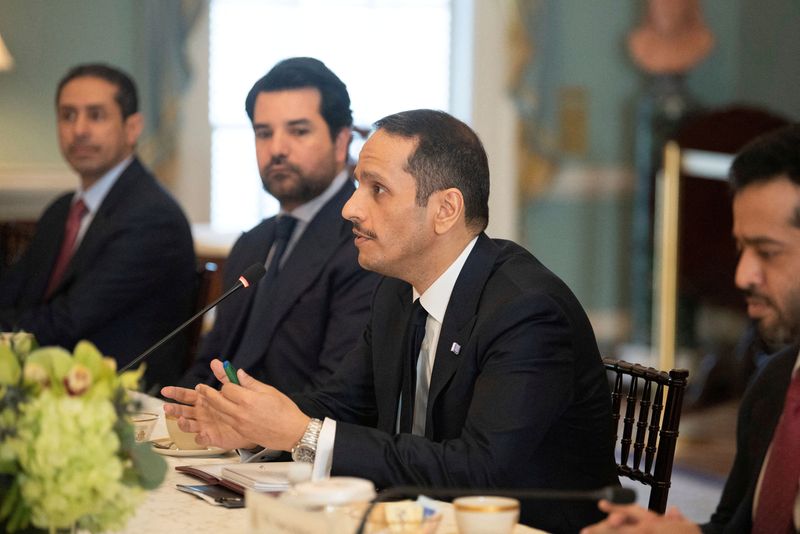By Jonathan Landay
WASHINGTON (Reuters) -The Qatari prime minister held secret talks with the supreme leader of the Taliban this month on resolving tension with the international community, a source briefed on the meeting said, signaling a new willingness by Afghanistan's rulers to discuss ways to end their isolation.
The May 12 meeting in the southern Afghan city of Kandahar between Qatari Prime Minister Mohammed bin Abdulrahman al-Thani and Haibatullah Akhunzada is the first the reclusive Taliban chief is known to have held with a foreign leader.
U.S. President Joe Biden's administration was briefed on the talks and is "coordinating on all issues discussed" by the pair, including furthering dialogue with the Taliban, said the source.
The source, who spoke on condition of anonymity, said other issues Sheikh Mohammed raised with Haibatullah included the need to end a Taliban bans on girls' education and women's employment.
The meeting represents a diplomatic success for Qatar, which has criticized Taliban restrictions on women while using long-standing ties with the Islamist movement to push for deeper engagement with Kabul by the international community.
The United States has led demands for the Taliban to end the bans on girls' schooling and women working, including for U.N. agencies and humanitarian groups, to restore their freedom of movement and bring Afghans from outside Taliban ranks into government.
The source's comments suggested that Washington supported elevating what have been unproductive lower-level talks in the hope of a breakthrough that could end the world's only bans of their kind and ease dire humanitarian and financial crises that have left tens of millions of Afghans hungry and jobless.
The White House declined to comment on the talks. The State Department and the Qatar embassy in Washington did not respond to requests for comment.
The Taliban did not immediately respond to a request for comment.
Ali Jalali, a former Afghan interior minister, said he does not believe Haibatullah will engage in serious dialogue with the United States and other powers until he eliminates factional rivalries and differences over Afghanistan's ban on girls' education.
Haibatullah "is going to hold his cards and until he consolidates his power," said Jalali, a professor at the U.S. National Defense University.
EDUCATION, EMPLOYMENT BANS
The restrictions on women's schooling and work have stymied humanitarian aid and are key reasons why no country has recognized Taliban rule since they seized power in August 2021, after the Western-backed government collapsed as the last U.S.-led international troops departed following two decades of war.
The treatment by the Taliban of women and girls could amount to a crime against humanity, according to a U.N. report presented in March at the Human Rights Council in Geneva. The Taliban say they respect women’s rights in line with their interpretation of Islamic law and Afghan customs.
Haibatullah, a hardline Islamist, has shown little willingness to compromise on his edicts.
His meeting with Sheikh Mohammed, however, suggests that he is open to exploring avenues for ending Afghanistan's isolation and boosting relief programs as the country sinks into hunger and poverty.
"It was a very positive meeting," said the source. Haibatullah was "very interested" in continuing a dialogue with the international community.
But eventual recognition by other countries of the Taliban administration, senior members of which remain under U.S. and international sanctions, is far from assured given their treatment of women and poor human rights record.
Sheikh Mohammed raised with Haibatullah the need to lift the bans on women's education and employment, including the bar on them working for U.N. agencies and other humanitarian groups, the source said.
The Taliban administration has been promising since January written guidelines allowing aid groups to operate with female staff.
The Taliban in March 2022 barred girls from high schools and extended the ban to universities in December.
They say they will reopen secondary schools to girls when "conditions" have been met, including devising an Islamic syllabus.
ADDRESSING HUMANITARIAN CRISIS
Sheikh Mohammed and Haibatullah also discussed efforts to remedy Afghanistan's humanitarian crisis, the source said.
The United Nations says nearly three-quarters of Afghanistan's 40 million people need help and it has warned that funding is drying up.
Sheikh Mohammed, the source said, raised with Haibatullah the "continued efforts on the ground" by the Taliban on counterterrorism, an apparent reference to Kabul's drive to crush an Islamic State affiliate.
The main ideological foe of the Taliban is based mostly in eastern Afghanistan but has targeted minorities and embassies in Kabul.
The U.S. and its allies say the Taliban harbor members of al Qaeda and the Pakistani Taliban. The Afghan Taliban deny that.
Sheikh Mohammed, who also serves as Qatar's foreign minister, met publicly in Kandahar with Mullah Hassan Akhund, the Taliban prime minister, on the same day he met the supreme leader. He was accompanied by Qatar's intelligence chief.
Neither side, however, revealed the talks with Haibatullah.
He almost never leaves Kandahar but has been the paramount religious, political and military leader of the Taliban since 2016, guiding the movement to victory over the Western-backed Kabul government.
Qatar allowed the militants to open a political office in Doha in 2013 and facilitated their talks with Washington that led to the 2020 deal for a withdrawal of the U.S.-led international force that they fought for 20 years.

While the tiny Gulf monarchy has no formal diplomatic ties with Afghanistan, its Kabul embassy is open and represents U.S. interests there.
Qatar has long pressed the international community to agree a "roadmap" of steps for the Taliban to gain recognition, arguing that isolating Afghanistan could worsen regional security.